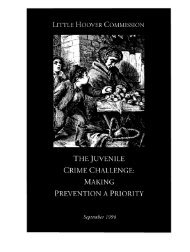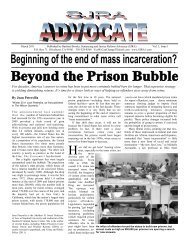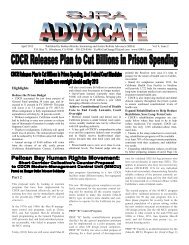Jailhouse Lawyer's Handbook - Sentencing and Justice Reform ...
Jailhouse Lawyer's Handbook - Sentencing and Justice Reform ...
Jailhouse Lawyer's Handbook - Sentencing and Justice Reform ...
You also want an ePaper? Increase the reach of your titles
YUMPU automatically turns print PDFs into web optimized ePapers that Google loves.
another law that protects prisoners’ rights to practice<br />
their religion. Like the RFRA, RLUIPA states that a<br />
prison cannot “impose a substantial burden on the<br />
religious exercise of a person residing in or confined to<br />
an institution” unless the burden is: (1) “in furtherance<br />
of a compelling governmental interest” <strong>and</strong> (2) “the<br />
least restrictive means of furthering that compelling<br />
interest.”<br />
The RLUIPA is different than the RFRA because it<br />
applies only to programs or activities that receive<br />
money from the federal government. This financial<br />
assistance gives Congress the right to pass laws that it<br />
might not otherwise be able to pass. So far, several<br />
courts that have considered the RLUIPA have found it<br />
constitutional. Mayweathers v. Newl<strong>and</strong>, 314 F.3d 1062<br />
(9th Cir. 2002); Charles v. Verhagen, -- F.3d ---, No.<br />
02-3572, 2003 WL 22455960 (7th Cir. Oct. 30, 2003).<br />
At least two other courts have found it unconstitutional.<br />
Madison v. Riter, 240 F. Supp. 2d 566 (W.D.Va.2003);<br />
Cutter v. Wilkinson, --F.3d --, 2003 WL 22513973 (6th<br />
Cir. Nov. 7, 2003).<br />
Although some people believe the law will eventually<br />
be held unconstitutional by the Supreme Court, just as<br />
the RFRA was, RLUIPA is currently good law in many<br />
jurisdictions. You should therefore consider bringing a<br />
claim under RLUIPA if you believe that your right to<br />
exercise your religion freely has been inappropriately<br />
restricted by authorities at your prison.<br />
3. Freedom from Racial Discrimination<br />
The Basics: Prison officials cannot treat you differently<br />
because of your race <strong>and</strong> the prison can’t segregate<br />
prisoners by race except in very limited circumstances.<br />
However, proving racial discrimination or segregation is<br />
hard.<br />
Racial discrimination <strong>and</strong> racial segregation by prison<br />
authorities are unconstitutional under the Equal<br />
Protection Clause of the Fourteenth Amendment.<br />
Washington v. Lee, 263 F. Supp. 327 (M.D. Ala. 1966).<br />
For example, prisons cannot prevent black prisoners<br />
from subscribing to magazines <strong>and</strong> newspapers aimed<br />
at a black audience. Jackson v. Godwin, 400 F.2d 529<br />
(5th Cir. 1968). Nor can they segregate prisoners by<br />
race in their cells. Sockwell v. Phelps, 20 F.3d 187 (5th<br />
Cir. 1994).<br />
When bringing a racial discrimination claim, it is<br />
important to underst<strong>and</strong> that it is not enough to show<br />
that prison rules had the effect of discriminating against<br />
you; you must show that a discriminatory purpose was<br />
at least part of the reason for the rules. David K. v.<br />
Lane, 839 F.2d 1265 (7th Cir. 1988). One way you can<br />
do this is by showing that discrimination is the only<br />
possible reason for a policy. For example, a federal<br />
court in Alabama decided that the constitution had been<br />
violated because it could not find any nondiscriminatory<br />
reason for the fact that African-<br />
Americans consistently made up a greater proportion of<br />
those detained in Alabama’s segregation unit than of<br />
those detained in Alabama’s prisons generally. McCray<br />
v. Bennett, 467 F. Supp. 187 (M.D. Ala. 1978).<br />
However, proving a case like this is not easy, <strong>and</strong> will<br />
probably require expert witnesses <strong>and</strong> statistical<br />
analysis. For example, another court held that prison<br />
officials did not violate the constitution when they<br />
censored certain cassettes, most of which were African-<br />
American rap music, because there was not enough<br />
evidence that they intended to discriminate against<br />
African-Americans. Betts v. McCaughtry, 827 F. Supp.<br />
1400 (W.D. Wisc. 1993).<br />
Even if you get past this first hurdle, <strong>and</strong> successfully<br />
prove discriminatory intent, courts may allow racial<br />
segregation or discrimination if prison officials show<br />
that it is essential to prison security <strong>and</strong> discipline.<br />
Washington v. Lee, 263 F. Supp. 327, 331 (M.D. Ala.<br />
1966). This exception to the general rule is narrow.<br />
Racial segregation must be in response to an obvious<br />
danger to security, discipline, <strong>and</strong> good order, <strong>and</strong> it<br />
may only be “limited <strong>and</strong> isolated.” U.S. v. Wy<strong>and</strong>otte<br />
County, Kan., 480 F.2d 969 (10th Cir. 1973). A vague<br />
fear of racial violence is not a sufficient justification for<br />
a broad policy of racial segregation. For example, one<br />
court did not accept the argument that there might be an<br />
increase in violence if people of different races shared<br />
two-person cells, since the rest of the prison was<br />
integrated. Sockwell v. Phelps, 20 F.3d 187 (5th Cir.<br />
1994).<br />
Most courts have held that racial discrimination in the<br />
form of occasional verbal abuse does not violate the<br />
Constitution.<br />
4. Protection from Sexual Discrimination<br />
The Basics: Women have a right to programs that are<br />
as good as the programs in prisons for men, but this<br />
right is very hard to enforce.<br />
The Equal Protection clause of the Fourteenth<br />
Amendment also prohibits discrimination based on<br />
JAILHOUSE LAWYERS HANDBOOK – CHAPTER TWO<br />
18





